Ever since the dawn of [humanity], even stretching back to the exits from Africa, people of different cultures have passed through this tiny country. There are places of worship to the Canaanite deities, Egyptian temples to Hathor, countless shrines to the Greek and Roman Gods, Phoenician influences and more.
These words were written by Myrtle, an archaeology student, professional artist and Pagan, living in the “tiny country” of Israel. With a population of approximately 8 million, Israel is a modern nation resting within what is considered to be one of the “cradles of civilization.” Somewhere between the ancient and the contemporary rests a unique socio-political culture built on Jewish heritage but enveloped by a legacy of diverse religious practice. Within that rich culture, there is a new, developing Pagan community.
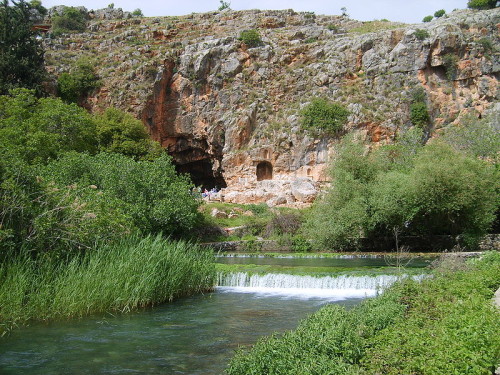
Banias, Grotto of the Temple of Pan, Israel
When outsiders learn that Pagans live in Israel, they are usually surprised. However Israeli Pagans believe that the country is a prime location for their practice because the land has been imprinted with centuries of human engagement. Shai Feraro, a Ph.D. candidate in History at Tel Aviv University, says:
About a year and half ago I took part in a ritual for Ashera on Mount Carmel, which was organized by Pagans. It was probably the first ritual of its kind in 2500 years.
Shai himself isn’t Pagan but he has devoted his academic work to studying modern Paganism and feminist spirituality. From his research, Shai estimates there are approximately 200 Israelis identifying as Pagan and probably an equal number who are either under the age of 18 or not connected to the community. There is also a growing “Goddess Spirituality” movement but many of its followers do not consider themselves Pagan.
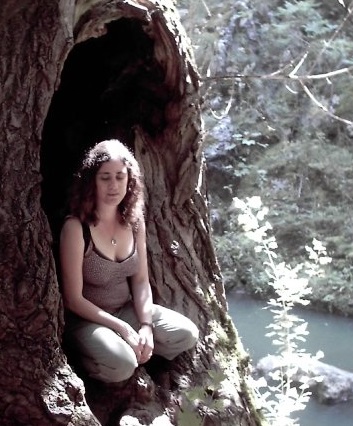
Moon Daughter
Myrtle says, “There isn’t a critical mass of Pagans,” but the numbers are growing. With that growth comes organization. The newly formed Pagan Federation International Israel (PFI) has sponsored pub moots and other gatherings. Since 2010 a weekend Mabon Festival has been held on ecological farmland in south-central Israel. Co-organizer Moon Daughter, an eclectic Pagan from Moshav, says “The last Mabon was the largest with about 60 attendees.”
Unfortunately local resources are still limited. Ilan, an eclectic Pagan studying Hermetic Magic explains, “There are no traditional teachers, covens or groups [here]. We learn mostly from books and the net … so it’s more a D.I.Y. thing.” However he views this lack of elders as a benefit calling the young Israeli Pagan community “self-grown.”

Ilan
Some of this self-growth comes directly from the land. Many Israeli Pagans include local deities in their practice. For example, Illy Ra, the National Coordinator for PFI, is a Kemetic Pagan living in the small town of Kadima in central Israel. She says, “Practicing Paganism in Israel gives one a better insight into Pagan religions such as Canaanite and Kemetism which are connected to the history of Israel.” Ilan adds:
Some Pagans are reclaiming ancient pre-Judaic Pagan beliefs using the Tanach, the New Testament and Ugaritic texts, performing ritual at ancient sites such as Rujum el Hiri, Megiddo … This land has a rich and documented history and we have ancient temples of a myriad of religions … The rich history of the land affects us in many ways.
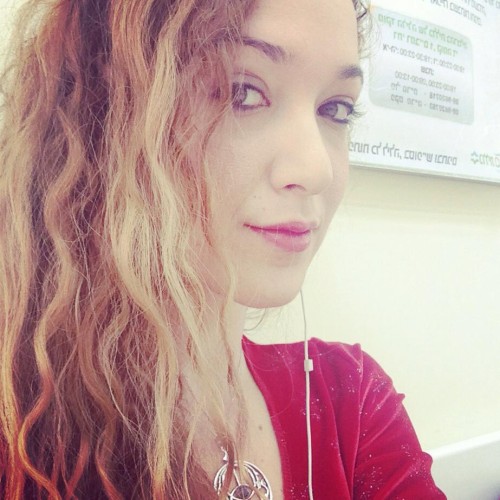
Liron White Wood Blank
Most Israeli Pagans are born into Jewish households – some secular and some traditional. That is where the commonalities in religious practice end. The “self grown” eclectic nature of Israeli Paganism makes it difficult to determine a majority Pagan faith. In his research, Shai found that most Israeli Pagans are “influenced by Wicca, Reclaiming or the Goddess movement. Some … are Reconstructionists – Hellenic, Kemetic, Canaanite and Nordic.” Both Myrtle and shop owner Liron White Wood Blank, indicated a Druidic influence in their personal practice.
Liron, Pagan teacher and solitary Priestess, is one of the few who practices and teaches openly. Her shop White Wood, located in Ramat Hasharon, is the only metaphysical store in Israel. She says, “The shop looks like a forest so it draws people’s attention.” She offers workshops, classes, lectures and readings. Liron adds, “I think it’s important that magic is accessible to everyone. I have Jewish talismans, Kabala talismans next to runes, tarot, Celtic/Druid charms, wands, books about witchcraft and more.” In March, the store will be celebrating its second anniversary.
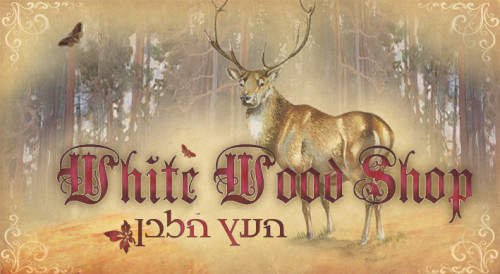
Even with all that visibility, Liron has experienced no negative aggression directed toward herself or White Wood. In fact there have been no instances of backlash to any Pagan anywhere. Most of the country doesn’t even know that the community exists. Those friends or family members who do know don’t seem to care.
While cultural anonymity can make practice difficult, Israeli Pagans actively protect their spiritual privacy. Moon Daughter explains, “We live under the radar …As long as we keep it that way we will not be harmed.” Of her mandatory time in the Israeli army, Myrtle says:
No one in the army knew I was Pagan, although it didn’t really matter. There is no better time to praise the Goddess than at dawn in the desert when you are on guard duty and everyone else is fast asleep.

Myrtle
Why do they insist on privacy if there’s been no backlash? Israel has no legal separation of “church” and state. Although it does recognize religious freedom, Israel is governed by both secular and Judaic law. Shai explains, “Jewish identity is considered to be a privileged one … When choosing to express their Pagan identity freely, Israeli Pagans run the risk of replacing these privileges with external negative reaction.” Moon Daughter agrees saying:
It is difficult to resist such a heavy burden of history and Jewish guilt and to do what would be considered turning our backs on our own “identity” as Jews. That is one of the reasons why I think it is very difficult for us here, because energetically we are trying to revive something [in] the very place that rose to destroy it.
Religious law informs Israeli culture, society and government. Marriage and divorce, for example, are regulated by such legislation . Bible studies are included in state-runs schools. Mass Transit and other public services are largely closed during the Sabbath. Aside from the obvious ideological conflicts, Ilan also points out a practical one. “Most of the Pagans I know are carless…and that makes it hard to meet on the weekend, where there is no public transportation.”
Although there have been progressive attempts to move toward a more secular government, there are no signs of immediate change. Currently the tensions between society’s secular and ultra orthodox factions have only gotten worse. The ultra orthodox population, the Haredim, want to protect and even increase religious-based social control. The secularists, including those in the religious minorities, seek just the opposite. As Ilan says, “Politics in Israel are very complicated.”
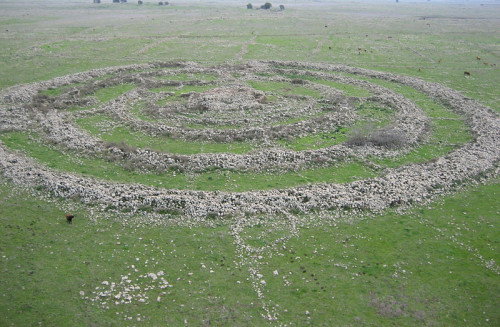
Gilgal Refaim (Rujum el Hiri) or Wheel of Spirits (Tumulus of the Wild Cat) circa. 3000 BCE
Despite the unique relationship between Israeli politics and faith, there are many positive opportunities for the developing Pagan community. In 2012 the University of Haifa held a spirituality conference that included a symposium entitled, “Contempory Paganism.” In May 2013 Ronald Hutton was a keynote speaker at Tel Aviv University’s Conference for the Study of Contemporary Religion and Spirituality. In July of that year, Morgana, the International Coordinator for PFI, officially announced the opening of the Pagan Federation International – Israel. Illy Ra is currently the National Coordinator and hopes to “to create a united community.” She says, “More people seek to meet other Pagans and get information about Paganism … PFI Israel hopes to answer these needs.”
In addition to helping Israeli Pagans, Illy Ra also looks forward to building bridges to the international Pagan community. She says “Unlike the image that might be created in the news, Israel is a safe place and has beautiful views [and] ancient Pagan places like the temple of the God Pan in Banias [and] Hathor’s temple in Timna Valley.” Myrtle agrees saying that Israel’s politically charged, high energy environment makes “life and magical practice interesting. There’s never a boring moment.”

The Wild Hunt is not responsible for links to external content.
To join a conversation on this post:
Visit our The Wild Hunt subreddit! Point your favorite browser to https://www.reddit.com/r/The_Wild_Hunt_News/, then click “JOIN”. Make sure to click the bell, too, to be notified of new articles posted to our subreddit.
Yay!! This article warmed this Jewitch’s heart. 🙂 Practicing witchcraft and polytheism while trying to retain one’s Jewish identity isn’t easy, and I’m glad to see there’s a growing movement.
I agree. I’ve been following Asherah for nearly three decades and have been overjoyed by all the new findings about her worshlp. Another happy Jewitch.
Canaanite Reconstructionism — now there’s a fascinating development!
I’d love to see Israelis abandon the Torah en masse, start baking cakes for the Queen of Heaven, and raise an Asherah pole over the Western Wall.
Thank you for this article! I love to see how Pagans live the world over.
It’s a fascinating opportunity to see some really good localised reconstructionism.
To be, perhaps, controversial, the article is written very much from a point of Jewish privilege. After all, it is not just Judaism that has had a strong historic presence in the region, is it? Whilst the Pagans in “Israel” may not have faced persecution, others have. Including (somewhat ironically) Christians.
The Deuternomists may have recorded their version of a strictly monotheistic history, but archeology has uncovered artifacts with the words “Yahweh and his Asherah” and similar items. Ancient Jews were literally worshiping the Goddess along with Yahweh worship. so, it is great now to see a variety of Pagan beliefs re-emerging in the “holy land”.
This is fascinating!
I’d just like to mention that the way the Tanach is taught in Israeli schools is not the way the Bible would be taught in American schools by Protestant fundamentalists. The Tanach (= Hebrew Bible–“Tanach” is an acronym for the titles of its three sections) is a collection of the earliest portions of the national literature of the Jewish people. It contains many primary sources for Israelite and Jewish history up through the Hellenistic period. Non-religious, secular Israelis (roughly half the Jewish population of Israel) have reasons to be conversant with the Tanach.
I once sat in on a university lecture in Illinois that was for school teachers learning about evolution. They had a guest speaker who was a rabbi. He explained that Jewish teaching (in his tradition) does not take Genesis literally at all. It just floored some of the more religiously conservative students who simply expected him to understand the Bible they way they did. He went on to tell them that he saw no problem with evolution and Jewish belief. It was great to see the impact he made on those students.
One of the most consistently frustrating things for me as a Jew was having to always explain to people that Judaism is not Christianity minus Jesus, it’s an entirely different animal. I generally have nothing but contempt for Christian Biblical literalists, but I still have great admiration for the complexity to Jewish exegesis.